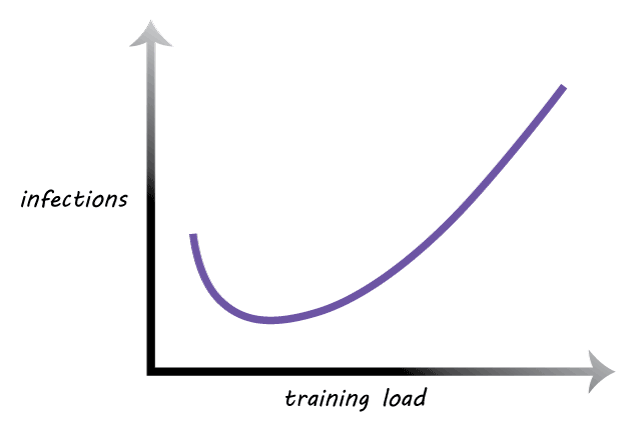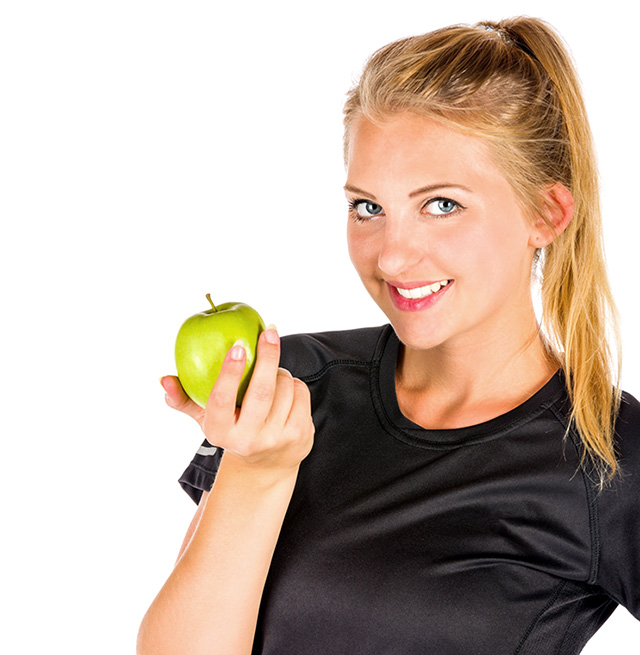Being unwell is not desirable for anyone, but for athletes there are extra reasons to stay healthy.
- Being sick means you can’t train and compete.
- Being sick means you are not improving via the scheduled training.
- A recent sickness may mean you are not performing optimally during competition.
- Heavy exercise while sick (or shortly after) can lead to worse outcomes, or prolonged sickness and delayed recovery.
One of the most common illnesses among all populations, especially in cold climates, is upper respiratory tract infections (URTI). URTI’s include the common cold, tonsillitis, sinusitis, laryngitis and pharyngitis. Athletes training at high-intensity levels are at a particular risk of getting sick.
Periods of heavy training loads, bouts of travel as well as changes to nutritional intake can increase the risk of sickness for athletes, often manifested as respiratory tract infections. Even though a moderate amount of activity is good for health, excessive amounts can increase the incidence of URTI, and this is especially seen in endurance athletes, or during periods of heavy training.
This can be illustrated in the classic J curve graph below, showing that low levels of fitness and exercise can have a high incidence of illness, moderate levels of exercise is associated with a strong immune system and a lower number of infections, while increased training load and over-training can decrease immune function and increase the incidence of illness.

How does Nutrition Influence Immunity?
Adequate nutrition is vital to allowing the body’s defenses to clear viruses, bacteria and pathogens. Adequate energy supplies are required from the macronutrients glucose, amino acids and fatty acids. Amino acids are also needed for the production of immunoglobulins and cytokines, and the synthesis of other proteins. Some micro-nutrients (e.g. zinc, iron and magnesium) play an important role in nucleotide and nucleic acid synthesis, others (Vit C & E) can defend against antioxidant tissue damage. Vitamin D can directly influence immune cell functions by regulating gene expression.
Restricting energy intake can influence immunity via the activation and increase in stress hormones. In the short term, stress can enhance immune responses because cortisol, a stress hormone is known to have anti-inflammatory properties. However, long-term stress can suppress or dysregulate the immune response by altering the cytokine balance, inducing inflammation, as well as suppressing immunoprotective cells. There are very complex mechanisms at play, but basically, some short-term energy restrictions for performance benefits are not harmful to immunity, but ongoing severe restrictions for long periods can be.
Nutrition Strategies to bolster immunity and reduce your risk of illness include
- Eat a high-quality fresh and varied diet to ensure micronutrient sufficiency
- Plenty of fruits and vegetables including all the different colors allow a broad range of immune-protecting micronutrients to be consumed.
-
Never neglect specific nutrients or foods regularly;
- Eliminating specific food groups (like dairy) will reduce certain nutrient intakes which may be valuable for your immunity.
- Consume some carbohydrates before and after exercise, especially long or intense training, because maintaining blood glucose during exercise lowers the stress hormones.
- Consuming some protein after exercise, increasing circulating amino acids, like glutamine, a non-essential amino acid, which is an important energy substrate for immune cells.
- Stay well hydrated to promote salivary IgA secretion
- Avoid prolonged periods of energy restriction, because over time this will put stress on the immune system. Fueling the body according to the amount of work that is done is crucial in balancing the body’s energy needs. Heavy training days require greater fueling.
-
Monitoring Vitamin D status.
- Vitamin D is an essential fat-soluble vitamin that influences innate immunity and has anti-inflammatory effects.
- Sun exposure will have the greatest impact on Vitamin D status, and deficiency can be common in the winter months depending on where you live.
-
Consider supplementing with the following (in order of importance and backing research):
- Probiotics
- Zinc lozenges (not tablets)
- Vitamin C
- Polyphenols, e.g. quercetin. These are anti-inflammatory
- Vitamin E
- Bovine colostrum
Note: For athletes who are subject to drug testing, please ensure all supplements you take are third-party independently tested for illegal substances. For e.g. ‘Informed Sport’ or HASTA.
 an apple a day keeps the doctor away
an apple a day keeps the doctor away Other Tips
- Don’t consume alcohol in excess
- Make sure your training loads are managed to avoid over-training
- A well planned dietary intake can allow you to cover all the nutrients required for optimal immunity
- Ensure you have good food and personal hygiene to avoid picking up the nasty bacteria and viruses that lurk around
- Avoid stress, and learn how to not stress about the things you cannot change, because stress hormones can increase the risk of sickness.
References
- Neil P Walsh. Nutrition and Athlete Immune Health: New Perspectives on an Old Paradigm. Sports Med. 2019 Dec; 49 (Suppl 2): 153-168.
- Dhabhar FS. Effects of stress on immune function: the good, the bad, and the beautiful. Immunol Res. 2014; 58 (2–3): 193–210.
Related Pages
- Supplements & Immunity in Athletes
- Food and Inflammation — certain foods can also help relieve inflammation.
- Healthy eating and sports performance
- Supplements for Athletes
- COVID Testing
- Preventing Illness with Nutrition — What you eat can play a big part in your daily health and wellbeing.


 Current Events
Current Events